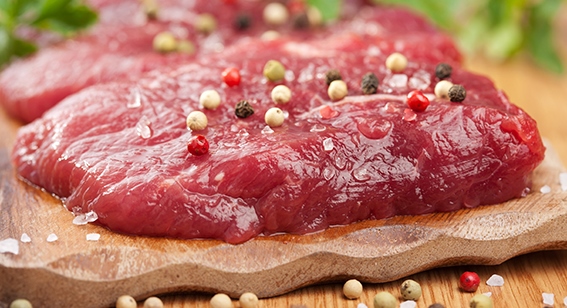Over recent days articles on the damaging effect of sausages (in contrast to unprocessed meats) have been more prevalent due to a warning from the World Health Organisation (WHO). It is estimated that across the world 34,000 people die every year of cancers which are furthered by salted, cured and smoked meat (read “sausages and meat products”). A possible cause of this is the use of curing salt and the development of nitrosamines.
According to estimations of the IARC (International Agency for Research on Cancer), which is part of the WHO, just 50 grams of sausage, bacon and ham per day increases the risk of colorectal cancer by 18%. At present German citizens consume an average of 38 kilograms of pork and 9 kilograms of beef annually, including processed products. This is too much, says the WHO. It recommends not eating more than 500 grams of meat per week. The Deutsche Gesellschaft für Ernährung (German Nutrition Society) recommends an even lower amount: “No more than 300 to 600 grams of meat and sausage per week”. The fact is that German men in particular eat approximately 1100 grams on average of this food group – meat still remains a sign of masculinity in Germany. “Fleisch ist mein Gemüse” (Meat is my vegetable), is the name of a book by Hans Strunk, which humorously portrays the typical lifestyle of young German people.
In connection with this issue, however, a distinction should be made between pure meat and processed meat. Whilst consumption of unprocessed meat seems to have little or no effect on the development of bowel cancers (there are various findings from scientific studies on this topic, which over recent decades have tended to increasingly qualify the cancer-causing effects), the role of meat products such as sausages, bacon and ham is more obvious.
The role of meat as a source of many nutrients such as iron and vitamin B12 is undisputed, even though it is possible to obtain these nutrients from a balanced, vegetarian diet in the form of plant-based foods, milk products and eggs.
Products produced using factory farming methods are unsustainable, particularly from an ethical point of view. There is also the issue that it is not always possible to know exactly what sausages contain. As chef Vincent Klink writes (SZ 31.10./1.11.2015), a sausage made of “freshly slaughtered, “streaky” pork which hasn’t been tainted by the smell of death of intensive livestock farming” from a butcher that you know and trust is a different product to industrially-processed sausage products.
Conclusion:
- There are no obvious health reasons to avoid eating meat, as long as you only do so in moderation.
- You should generally try to eat as little sausage meat, bacon and ham as possible and really check where they are produced and especially what the ingredients are.
- In addition, an intake of fibre through a varied diet with the least amount of processed foods possible e.g. in the form of wholegrain products, pulses and vegetables, can reduce the negative effects.
Nonetheless, anyone interested in the sustainability of their food should reduce the amount of meat they eat further or stop eating it all together as the production of meat has a considerable environmental impact.
There are a huge number of books available on the topic of factory farming and one of the most important publications of recent years is the self-experiment “Anständig essen” (Eating Decently) by Karin Duve (Galiani Berlin, TB bei Goldmann Verlag) in which a young woman grapples with the various forms of ethically-correct nutrition. This topic is addressed with many interesting observations and experiences.
However, even without becoming vegetarian you can do something for your health and sustainable agriculture by reducing the amount of meat and sausages you eat, and by buying organic products or game meat produced using tradition methods .
Here are some addresses for reliable, flavoursome meat from farms with animal welfare standards in Germany and South Tyrol:
- Gutshof Polting (in german)
- Bäuerliche Erzeugergemeinschaft Schwäbisch-Hall (in german)
- Laugenrind – beef from Val d’Ultimo/Ultental
- Murnau Werdenfelser Rind (in german)
- Limpurger Rind aus Hohenlohe (in german)
Sources:
- IARC Monographs evaluate consumption of red meat and processed meat. PRESS RELEASE N° 240, International Agency for Research on Cancer (IARC), WHO, 26 October 2015
- Q&A on the carcinogenicity of the consumption of red meat and processed meat. WHO, October 2015
- Arme Würstchen – Kritik an WHO-Einstufung. Vincent Klink, SZ Artikel vom 31.10./1.11.2015 (in german)
- Fleischverzehr und Dickdarmkrebs Rotes Fleisch – Vom gehaltvollen Nährstofflieferanten zum kanzerogenen Agens? A. Ströhle, M. Wolters und A. Hahn, Ernährung im Fokus 15-09-10/15 (in german)
- Verhängnisvolles Trio: Nitrat – Nitrit – Nitrosamine. AID Infodienst (in german)
